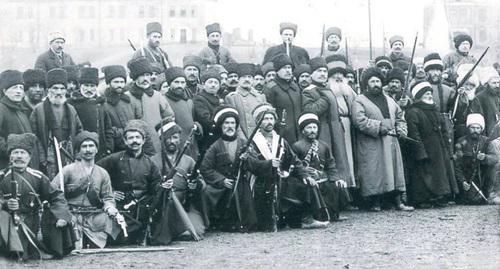
06 November 2017, 21:43
October Revolution led to modern conflicts in the Caucasus
The causes of many today's conflicts in the Caucasus should be sought in the events that occurred in the autumn of 1917, said the scientists interviewed by the "Caucasian Knot".
October Revolution of 1917 led to the fact that the situation in the Caucasus became uncontrollable, said Alexander Skakov, a senior researcher at the Institute of Oriental Studies of the Russian Academy of Sciences (RAS). It was the events of 1917 that led to an armed conflict of the Ottoman Empire with Armenia, and to the conflict over the pre-border areas of Armenia with Georgia, Mr Skakov has recalled.
"The revolution gave nothing good to the Caucasus. Nobody has ever calculated the human sacrifices as a result of the revolution and interethnic wars; there are still no concrete figures on how many people were killed and suffered," Alexander Skakov told the "Caucasian Knot" correspondent.
After the victory of Bolsheviks in October 1917, "the entire social space of the former Russian Empire was plunged into chaos," Lyudmila Gatagova, a leading researcher at the RAS' Institute of Russian History, has noted.
At the same time, she said, the revolutionary events "became a stimulating factor for strengthening the centrifugal tendencies and activating separatist forces in the outskirts of the former empire, including the Caucasus."
"The Bolsheviks declared war on all independent peripheral political alliances and governments. They tried in every way to prevent the establishment of control of foreign states over Transcaucasia and Northern Caucasus. Having seized power in the former empire, Bolsheviks immediately began defending the traditional Russian geopolitical interests. In many respects, the lack of internal unity among the Caucasian nations helped them to achieve success," Ms Gatagova has noted, stressing that that as a result, Bolsheviks "by no means stopped the interethnic contradictions and antagonisms; they only drove all the underlying conflict reasons into the depth."
"In the Soviet years, under the pressure of the state repressive machinery, all these discontents and contradictions remained in a latent state for decades. As soon as the pressure of the punitive machine weakened, they began floating to the surface, and resulted, already in the post-Soviet era, in another outbreak of conflicts," said Lyudmila Gatagova.
Full text of the article is available on the Russian page of 24/7 Internet agency ‘Caucasian Knot’.
Source: CK correspondents




